Fifteen years ago, I and a group of anglers spent three unscheduled days loitering around a southeast Alaska fishing lodge waiting for the weather to lift so our float plane back to Petersburg could make the flight across the salt to pick us up. But the weather in southeast Alaska is a finicky bastard, and it refused to cooperate. For most, the idea of being “stranded” in an Alaskan fishing lodge doesn’t sound too bad. But we were the last group in for the year, and the lodge’s staff spent the first day of our unplanned extension putting away boats and gear and getting the lodge ready for the winter — unless we wanted to cast off the lodge’s dock for the odd dusky rockfish, we were done fishing.
The first night, the group was OK — almost jovial. After all, lodge life is good life, right? The remaining bottles of brown liquor magically showed up on the dining room table, as did a deck of cards and some poker chips. We stayed up until the lodge manager quietly shut off the generator around midnight, eliciting a few groans. But, as we left the dining hall and staggered off to our cabins, we looked to the north and were treated to a beautiful aurora borealis light show. The rain had moved out and things were looking up — surely the Beaver could make the short flight in the morning, right?
The next morning, the weather returned, and Southeast Alaska was encased in fog and a near-constant drizzle. No plane until at least noon, we were told, as we gobbled up the last of the lodge’s eggs and bacon and downed the last carton of orange juice.
By noon, nothing had changed. Rain. Mist. Fog. No plane. The drinking started in the middle of the afternoon and all the booze was gone by the time we staggered off to bed around 10. No light show. No stars. Just the persistent drizzle. We did have our bellies full, though. We were treated to the last few halibut steaks from the freezer.
Day three started when the cook dropped a box of frosted flakes on the table alongside a quart of milk. No eggs. No meat. No juice.
More Like This
By then, attitudes were growing about as desperate as our food supply, and the weather just hung in there — no small aircraft flights in or out. Faces were long and tempers were short. To avoid conflict, we all retreated to our rooms and did our best to keep our minds occupied. I burned through the lodge’s modest library of fishing books, watched about half of the lodge’s DVD collection on the old TV mounted precariously in the corner of my room and wandered to the window every few minutes, hoping to see the sun poking through the oppressive cloud cover.
I slept a lot, largely out of self defense.
That afternoon, we dined on peanut butter and honey sandwiches, accepted gratefully, and that evening, we ate fresh rockfish a couple of the guys managed to catch off the dock. Accompanied by instant mashed potatoes and a bag of frozen peas and carrots, it was a fitting last meal. Everybody was on everybody else’s last nerve, and I was sure we were nearing a full on Lord of Flies ordeal.
The fourth morning, when we were told there was to be no plane, things got salty. For the fourth day, we had to call Alaska Airlines on the satellite phone and make changes to our plans, and the general mood was in the crapper. Two longtime fishing buddies got into a shoving match over their last pack of cigarettes and had to be separated. The situation was devolving. Rapidly.
Finally, the lodge manager had a great idea. He unpacked and de-winterized one of the lodge’s skiffs, and loaded our gear into it. He motored the boat across Port Protection to Labouchere Bay and the “end of the road,” and loaded the gear into the lodge’s beat-up old van. He then returned to the lodge, loaded the five of us into the skiff and took us to the van. He handed me the keys.
“Just stay on the main road until you get to Hollis,” he said. “Leave the van at the ferry terminal.”
So we started driving. Within minutes we crossed over a gorgeous salmon stream brimming with a late pink run and the speculation started.
“I bet there are silvers in there,” one of the guys, a physician from Oregon, said from the back seat.
“Maybe,” another angler said. “But I know there are some big Dollies in there with all those damned pinks.”
Things got quiet as we motored through the rainforest mist. We crossed another salmon stream. And then another. Each time, I’d slow the van down and five sets of eyes would carefully examine the tannin-stained water as it flowed under the bridge. Finally, we got to a little native community, where the spicy attitudes of the two fishing buddies were salved by the purchase of a few packs of Marlboro Lights at an exorbitant price.
Then, about two hours into the drive, we crossed yet another salmon stream, this one absolutely bursting with fish.
“I could use a pit stop,” one of the two buddies said from the middle row.
“Me, too,” his pal said. I pulled the van over after crossing the stream, and tentatively waited for the guys to light up and get their fix. Then, the doctor piped in from the back of the van.
“My flight’s not until tomorrow morning,” he said. “Want to get the waders out and see if we can’t stick a few?”
Everybody froze momentarily, as they pondered the question. A few spent the next few minutes doing some algebra, trying to determine how long we had until we had to catch the boat to Ketchikan. The consensus?
Doable.
Fifteen minutes later, five guys who, a day earlier, were on the brink of deciding which of the gang was going to be killed and eaten first, were honest-to-God giddy. The rain kept falling as waders and rain gear were sorted from carefully packed bags. Rod tubes appeared from out of nowhere, and for the next two hours, we enjoyed the best fishing of the trip for brightly colored Dolly Varden and a handful of egg-eating sea-run cutthroats.
The smiles and the laughs returned. The good-natured jeers ensued. Hero shots with big Dollies were taken. After three days spent cooped up in their cabins, this was the tonic needed to erase the ire that built up when the weather set in and locked us up at the lodge.
We made the ferry with about 10 minutes to spare, and the “goodbyes” at the Ketchikan ferry terminal were lively and full of promises to stay in touch. Some of those promises were kept, and others have fallen victim to time.
But none of us will forget the three days we spent stranded at the lodge, and how a couple of hours of stellar fishing made a bad trip a good one.
Maybe one day, we’ll have the good fortune to get stranded again.




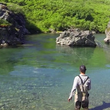
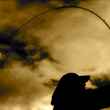
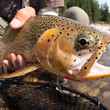
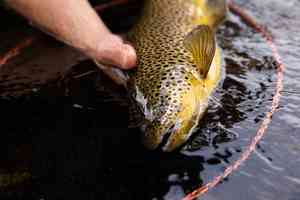

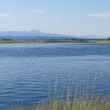
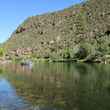
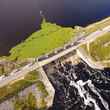
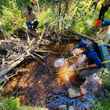
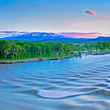
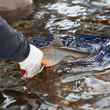
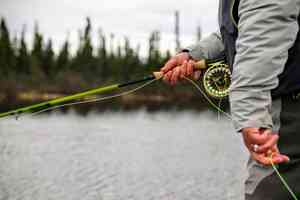


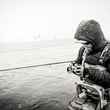
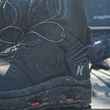



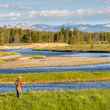
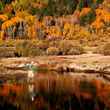
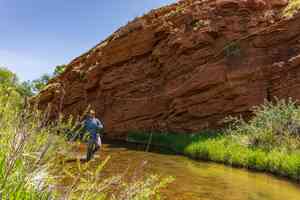
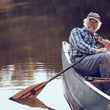
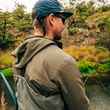
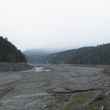
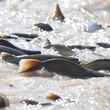
Comments